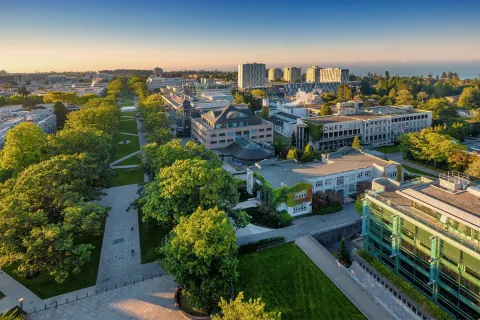UBC SALA tops Canadian university rankings; Nursing and Engineering take second

The University of British Columbia’s Faculty of Applied Science continues to prove its excellence in various disciplines, with the latest rankings placing the Faculty at the forefront of academic achievement. These rankings are a testament to the Faculty's unwavering commitment to excellence and innovation.
UBC’s School of Architecture and Landscape Architecture (SALA) placed first in Canada for architecture and built environment for the sixth year in a row according to QS World University Rankings. UBC School of Nursing placed second on Maclean’s best nursing programs, making this the fourth year among the top or second position. Times Higher Education ranked UBC Engineering second across Canada for the fifth year as well.
“These rankings are a reflection of our Faculty’s remarkable achievements,” said Dr. James Olson, Dean, Faculty of Applied Science. “They also demonstrate the real-world impact our researchers have on our cities and communities by advancing equality and diversity, pioneering climate solutions, and creating meaningful learning experiences for our students.”
Global impact on global issues
The Faculty’s impact can be seen on an international scale, with SALA students and faculty members bringing Canada’s housing crisis to the world stage at the 2023 Venice Biennale of Architecture. As the country’s representative to the world’s biggest architecture festival, the Architects Against Housing Alienation are shining a light on the urgent need for safe, equitable, and affordable housing in Canada to hundreds of thousands of visitors.
UBC Applied Science also welcomed German President, Frank-Walter Steinmeier, earlier this year in a visit that highlighted the Faculty’s strong research partnerships with Germany. The President toured the soon-to-open Smart Hydrogen Energy District, a unique hydrogen research platform, and spoke with researchers working on clean energy and climate change solutions.
Breaking barriers
The School of Nursing remains committed to health equity, social justice and anti-racism through work such as empowering people with dementia, collaborating on national standards for substance use education and intervention in schools, and developing a world-first program to transform mental health therapy for men.
Nursing and engineering researchers are also pushing the envelope when it comes to studying and developing technological advances through researching the use of social robots in elder care, collaborating with Honda to develop a breakthrough ‘robot skin’ that will improve prosthetics and human-robot interactions and transforming construction vehicles into AI-powered smart robots.
Taking on climate change
Applied Science researchers are pursuing a wide range of innovative solutions to address environmental concerns, including successfully eliminating ‘forever chemicals’ or PFAS from drinking water, using fruit waste as fuel and turning bitumen from Alberta’s oilsands into carbon fibre.
UBC engineering and architecture students, too, are among those redefining sustainable construction. Third Quadrant Design, a student design team, designed and built an award-winning teaching and learning space on campus that is near zero in embodied carbon.
UBC’s four-year Environmental Engineering program received accreditation this year, enabling the Faculty to deliver on its mission to create the leaders for tomorrow. The program aims to provide an outstanding educational experience that equips students with the knowledge, skills, and ethical principles needed to tackle the complex environmental challenges of our time.
Learn more about UBC Applied Science:




